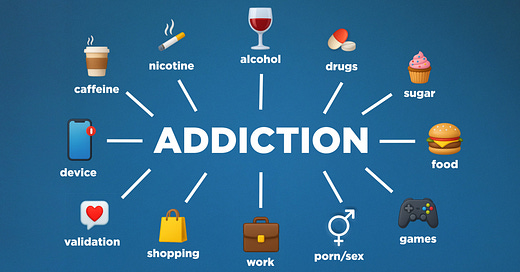Is Addiction Part of the Human Experience?
Why Avoidance, Not Just Substances, Separates Us from Our Most Authentic Work
This question has been circling through my mind for ages, especially recently as I reflect on the nature of desire itself. That deep resonance of wanting something. The persistent feeling of "not feeling satisfied enough."
Maybe addiction isn't the black and white problem we often make it out to be. Maybe it exists on a spectrum that touches all of us in different ways.
Since quitting drinking, I've noticed how my relationship with sugar shifted. Suddenly dessert became the first thing I'd look at on any menu. The same seeking, the same ‘not quite enough’ feeling, just pointed in a different direction. There's sugar with food, salt with food, the endless scroll of our devices seeking affirmation and connection, alcohol for its numbing effects, caffeine for its jolt of energy. The spectrum of what we can become addicted to is vast.
But here's what I've learned: addiction is more complex than any label. It's gray. It comes and goes. It exists at different levels. And for most of us, it's about avoiding something uncomfortable we don't want to face about ourselves.
I know this intimately because with alcohol, one was never enough. Two was never enough. Even at three, four, or five, I kept going until I reached nine or ten beers deep, only stopping when exhaustion or hunger finally took over.
Even at 18 or 19, this was already how I drank—which led to one of the most consequential nights of my life. I barely remember any of it.
I was in Daytona Beach with friends, partying in a hotel. I don't remember much except taking roofies along with the beer because it amplified the effects. I don't remember getting an eyebrow piercing that night. I don’t remember how I managed to go from venue to venue partying endlessly. I remember throwing up. I remember asking friends to take me to get food, but no one would. I leaned over to my friend who was passed out on the bed and somehow convinced him to let me take his car.
However many drinks deep, plus the drugs, I drove onto the strip where traffic was slow. I managed to hit the back of a trailer hitch. Across the street, a police officer arrested me on the spot.
There I was in the holding cell being the youngest, smallest person wearing an orange suit, sitting next to a large man who asked if I was going to eat my apple from the meal they gave us. “No, you can have it,” I said. It felt like the fight scene from the movie Life with Eddie Murphy and Martin Lawrence. My parents bailed me out the next day, and one of their conditions was leaving out the eyebrow piercing I didn't remember getting. That felt like a fair trade.
The most haunting part? These are just flashes. Little blips of memory from what should have been a fully experienced night of my life. This wasn't just one night—it was the beginning of years of similar experiences, each one stealing more pieces of my story.
Fast forward through those years, and I spend my career capturing and preserving important moments in people's lives. Yet here I was, helping others preserve their stories while systematically erasing my own.
How can we create authentic work when we're not even present for our own experiences?
This question cuts deeper than just my profession. It strikes at the heart of what addiction really does—it separates us from ourselves. We reach for substances not because they enhance who we are, but because there's something about ourselves we don't want to face. Something we believe others won't like. Satisfication. I’m leaving the red dots underneath telling me I misspelled a word. Because that's exactly what we're chasing through substances: this weird hybrid that promises both satisfaction and gratification but delivers neither fully.
We tell ourselves it's about social acceptance, camaraderie, celebration. But what if the person we truly are—beyond any addiction—is far more powerful than any substance can recreate?
What if our authentic creative voice, our genuine presence, our real stories are waiting on the other side of whatever we're using to escape ourselves?
I'm curious about your experience.
What have you noticed about the relationship between substances and your creative work? What moments might addiction have stolen from your own story?
The conversation starts here.
If this resonated and you’re seeking more personalized support, explore my Unfiltered Creation coaching program or book a call here.






As a former addict, I agree wholeheartedly. My relationship with sugar — chocolate in my case — has changed. Although I’m much more in control and it doesn’t have the same consequences, I know there’s a part of me who wants to be “full”. In French, when we talk about someone who drinks a lot, we say “il biberonne”, i.e. more or less “he drinks with a baby feeding bottle”. That says it all.
When you’re sober, you start being aware of all these quirks and reflexes, I guess. And yes, we escape from ourselves, or some parts of ourselves to be precise. Recognizing them and managing them is the work we gotta do.
Our authentic selves, our real potential selves, I would say, are not the wounds, the pain, the addiction. They are underneath. The question I always have in mind is why we do this to ourselves in the first place.
Yes, addiction is part of the human experience. For many of us, as it was with me, substances give many of us a way out from thinking about what is happening in our lives at the moment that we don't want to cope with.